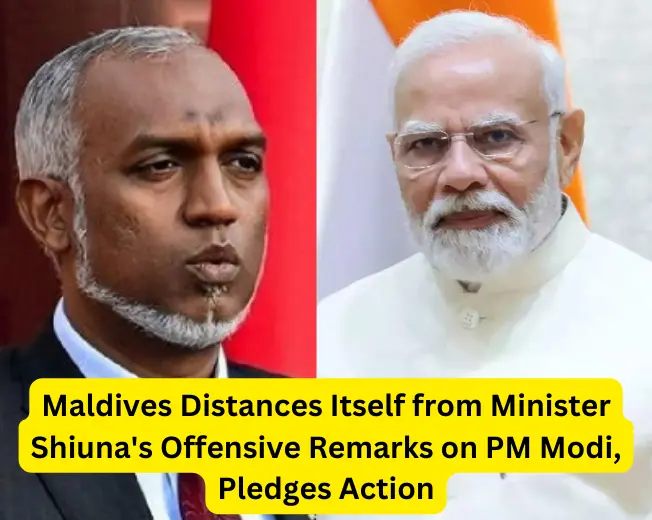In a recent turn of events, the Maldives government has taken a decisive stance regarding derogatory remarks made by Mariyam Shiuna, the Deputy Minister of Youth Empowerment, against Indian Prime Minister Narendra Modi. The official statement, released on Sunday, January 7, underscores the government’s commitment to clarifying that Shiuna’s comments are strictly personal and do not reflect the official position of the Maldivian administration.
The controversy erupted when Shiuna posted offensive comments on a social media platform, including disrespectful language and a comparison of India to cow dung. The now-deleted post also labeled PM Modi as a ‘clown’ and a ‘puppet,’ particularly criticizing his recent visit to Lakshadweep.
Government Emphasizes Responsible Freedom of Expression Amid Diplomatic Tensions
The government’s official statement acknowledged the existence of derogatory remarks on social media platforms, categorizing them as personal opinions. Importantly, the government affirms its belief in the democratic exercise of freedom of expression but stresses the need for responsible communication. It specifically emphasizes avoiding the spread of hatred, negativity, and actions that may hinder the close relationships between the Maldives and its international partners.
The statement declares, “The relevant authorities of the Government will not hesitate to take action against those who make such derogatory remarks.” This firm commitment signifies the Maldivian government’s dedication to maintaining positive relationships and diplomatic decorum.
International Backlash and Celebrity Response: A Ripple Effect
Mariyam Shiuna’s offensive comments triggered a swift and widespread response, not only within the Maldives but also from international figures. Former Maldivian president Mohamed Nasheed condemned Shiuna’s language, emphasizing the crucial role that diplomatic decorum plays in preserving positive relationships with key allies like India. Another former president, Ibrahim Mohamed Solih, joined in condemning the use of hateful language against India, stressing the enduring friendship between the two nations.
Indian celebrities, including Akshay Kumar, John Abraham, and Sachin Tendulkar, added their voices to the conversation. They urged people to explore Indian islands like Lakshadweep and Sindhudurg, emphasizing the beauty and cultural richness these destinations offer. In a tweet, Akshay Kumar conveyed his astonishment and dismay in response to the offensive remarks, urging unity to bolster domestic tourism.
This incident sheds light on the intricate dynamics between nations in an era of social media, where the words of a government official can resonate globally, impacting diplomatic relations and public perception.
Navigating Diplomatic Waters: PM Modi’s Lakshadweep Visit and Subsequent Fallout
For context, the controversy arose following Prime Minister Modi’s visit to Lakshadweep on January 2 and 3. The visit aimed at inaugurating the Kochi-Lakshadweep Islands Submarine Optical Fiber Connection and dedicating various developmental projects to the nation. PM Modi, during his stay, encouraged travelers to explore the beauty of Lakshadweep, highlighting its timeless legacy of traditions and the spirit of its people.
Despite the positive intentions behind the visit, Mariyam Shiuna’s derogatory comments have escalated tensions, not only between the individuals involved but also among the broader diplomatic community.
Impact on Public Perception: ‘Lakshadweep’ Trends on Google
The fallout from this incident extends beyond diplomatic circles to public perception and curiosity. After PM Modi’s visit, ‘Lakshadweep’ became the ninth most searched word on Google in India, reflecting a surge in online interest. With more than 50,000 searches on that day, the incident showcases the tangible impact that diplomatic incidents can have on public curiosity and information-seeking behavior.
As the story unfolds, it raises questions about the delicate balance between freedom of expression, diplomatic responsibilities, and the role of social media in shaping international narratives.
In conclusion, the Maldives government’s swift response to Mariyam Shiuna’s offensive remarks underscores the importance of maintaining positive diplomatic relationships. The fallout from this incident highlights the complexities of international interactions in the age of social media and the ripple effects that individual comments can have on public perception and global curiosity. Stay tuned for updates on this evolving story and its implications for diplomatic relations between the Maldives and India.
Read more about Marketing News, Advertising News, PR and Finance News, Digital News.





